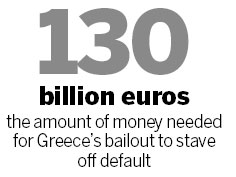Greek leaders end bailout talks without full deal
Updated: 2012-02-10 07:38
(China Daily)
|
|||||||||||
Austerity measures are approved; pension cuts fail to materialize
ATHENS, Greece - Greece failed to finalize terms for a crucial 130-billion-euro ($173 billion) bailout on Thursday, but Finance Minister Evangelos Venizelos headed to Brussels to meet top European Union officials, hoping to rescue the agreement and stave off default.
The Athens talks stalled after the leaders of the three parties backing Greece's coalition government approved sweeping new austerity measures but failed to agree to creditors' demands to make 300 million euro in pension cuts.
Venizelos issued a dramatic plea to the coalition leaders to swiftly resolve their differences, warning that Greece's "survival over the coming years" depends on the bailout and a related debt-relief agreement with private creditors.
"It will determine whether the country remains in the eurozone or whether its place in Europe will be endangered," he said.
"There is no room for any other expediency: we must look Greeks in the eye, look at the national interest and the interests of our children."
Debt inspectors from the European Union, the European Central Bank and the International Monetary Fund - collectively known as the Troika - held talks for five hours through Wednesday night with Prime Minister Lucas Papademos, Venizelos and Labor Minister Giorgos Koutroumanis. But they failed to resolve the latest sticking point: a demand for substantial cuts in supplementary pensions.
The issue that has threatened to derail the talks concerns cuts of about 300 million euros that must be made so Greece can reach its fiscal targets for 2012. At stake is the 130-billion-euro bailout that will stave off default for the country.
It was not clear whether Papademos would meet again with coalition backers George Papandreou, Antonis Samaras and George Karatzaferis.
 |
On Wednesday, the three leaders held talks with Papademos that lasted seven and a half hours and backed a new austerity program that includes a 22 percent cut in the minimum wage, firings of civil servants, and an end to dozens of job guarantee provisions.
Unions responded angrily to the new cuts and said they would carry out strikes in protest.
"Our rights have disappeared," Vangelis Moutafis, a senior member of the country's largest union, the General Confederation of Greek Workers, told Vima radio.
The Greek government has already accepted a demand to fire up to 15,000 public sector workers in 2012.
"At 2 am, all I can say is a line from the Beatles: 'It is a hard day's night'," Karatzaferis told reporters upon leaving his party's headquarters for home.
Jacob Funk Kirkegaard, research fellow at the Peterson Institute for International Economics, said the lack of progress made during Wednesday's talks highlighted the "certain amount of political theater involved here".
"The political leaders in Athens are campaigning," he said. "They need to be seen by the Greek population as fighting until the very last drop of blood. ... They are facing off against the Germans and IMF and the rest of the world."
A disorderly default by Greece would likely lead to its exit from the eurozone, a situation that European officials have insisted is impossible because it would hurt other weak countries such as Portugal, Ireland and Italy.
Two years of cutbacks already have seen unemployment rise to around 19 percent and poverty to 20 percent in Greece.
Without help, Greece would not have enough money to pay off a big bond payment due on Mar 20, which would trigger a default that could send shockwaves through financial markets and the global economy.
Since May 2010, Greece has been kept solvent by payments from a 110-billion-euro international rescue-loan package.
When it became clear the money would not be enough, a second bailout was agreed on last October.
Two years of harsh austerity measures have made Greek voters increasingly hostile.
Some 91 percent of Greeks believe the coalition government is taking the country in the "wrong direction", according to a February tracking poll published on Wednesday in the Greek daily Kathimerini.
Associated Press
Today's Top News
President Xi confident in recovery from quake
H7N9 update: 104 cases, 21 deaths
Telecom workers restore links
Coal mine blast kills 18 in Jilin
Intl scholarship puts China on the map
More bird flu patients discharged
Gold loses sheen, but still a safe bet
US 'turns blind eye to human rights'
Hot Topics
Lunar probe , China growth forecasts, Emission rules get tougher, China seen through 'colored lens', International board,
Editor's Picks

|

|

|

|

|

|





